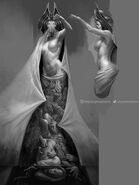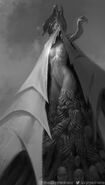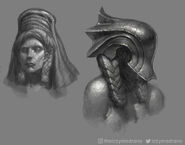
This article contains lore based on real-life sources of the Greek mythology as introduced from the God of War Greek era.
Nyx (Greek: Νύξ) is the Primordial entity of the Night and one of the first primordial gods born from Chaos.
Quick Answers

Could Nyx, the Greek goddess of night, potentially defeat Zeus in a battle?

What is the significance of the statue of Nyx in Greek mythology?

What does the Nyx goddess statue symbolize in ancient Greek art?

How is Nyx depicted in Greek art and sculpture?

Who are some of the personified gods that Nyx is known to be the mother of?

Greek Mythology
Nyx (Ancient Greek: Νύξ, "night") – Nox in Latin translation – is the Greek goddess (or personification) of the night. A shadowy figure, Nyx stood at or near the beginning of creation and was the mother of other personified gods such as Hypnos (Sleep), Charon, and Thánatos (Death). Her appearances in mythology are sparse, but reveal her as a figure of exceptional power and beauty - even Zeus himself avoids provoking her 'maternal' wrath.
She is found in the shadows of the world and only ever seen in glimpses. In Hesiod's Theogony, Nyx is the daughter of Chaos, and sister of Erebus (Darkness). With Erebus, Nyx gives birth to Aether (Upper Air and Light), and Hemera (Day). Later, on her own, Nyx gives birth to Thanatos (Death), Hypnos (Sleep), the Oneiroi (Dreams), the Hesperides, the Moirai (Fates), the Keres, Nemesis (Indignation, Retribution), Apate (Deceit), Geras (Old Age), and Eris (Strife) and others. In his description of Tartarus, Hesiod locates there the home of Nyx and the homes of her children Hypnos (Sleep) and Thanatos (Death). Hesiod says further that Hemera (Day), who is Nyx's daughter, left Tartarus just as Nyx entered it; when Hemera returned, Nyx left.
In the Iliad, Hypnos, the minor god of sleep, reminds Hera of an old favor after she asks him to put Zeus to sleep. He had once before putting Zeus to sleep at the bidding of Hera, allowing her to cause Heracles (who was returning by sea from Laomedon's Troy) great misfortune. Zeus was furious and would have smitten Hypnos into the sea if he had not fled to Nyx, his mother, in fear. Homer goes on to say that Zeus, fearing to anger Nyx, held his fury at bay, and in this way, Hypnos escaped the god's wrath.
God of War: Ascension
Nyx is one of the oldest and original Greek deities, originating from Chaos itself. She must have fought during the great war of the Primordials, presumably on the side of Ouranos, who would proceed to win and take supreme lordship of the cosmos and its dieties. Nyx is the sister-consort of Erebus, the God of Darkness.
She has birthed many primordial dieties, who personify the quitessential abstractions of nature like Morpheus and Thanatos, aswell as Charon among many more. None of her dark offspring command such power over the cosmos and its lifeforms, like the Sisters of Fate, whose rule over the past, present and future none can defy. The Fates would live on the Island of Creation, an idylic place that Nyx and the other Primordials created before the Beginning of Time.
The old Goddess has lived well into the Olympian Age, bringing forth her cloak of darkness onto the Heavens before she returns back into her own world of eternal darkness and gloom. One known way to access the Realm of Night was through a portal at the Statue of Apollo where she was seen giving light during the Trials of Archimedes.
She also appears in the God of War: Ascension multiplayer stage Walls of Troy, where it's stated that Helios is banishing her from the night sky. This may suggest that Nyx is not as powerful as in mythology, or that the Olympians are more powerful than Primordial deities. God of War's animation director Bruno Velazquez stated this to be the case.[1]
Powers and Abilities
Powers
She is an extremely powerful goddess, being one of the Primordials. She is strong enough to fight Helios, who can destroy the World, but Helios is implied to always force her to retreat.
- Umbrakinesis: As the Goddess of Night, she has divine authority and absolute control over shadows and darkness. Without Nyx, it can be presumed that the night itself would not occur and the cosmos would be thrown into dissarray, similar to the disappearance of Helios, the bringer of light.
- Creation: Nyx was involved in the creation of the Island of Creation, with one version naming her and Chaos in particular as the creators of it.
- Acausality: The laws of time and space work differently for the Greek dieties. Nyx herself predates the creation of Time.
- Immortality: As a Goddess she is immortal unless killed by a fellow God, like a Primordial, Titan or Olympian. Her survival of the Primordial War, unlike known casualties like Ceto and Ourea speaks for her power and durability.
Trivia
- Nyx and Erebus are the first couple in the Greek history, with no known rifts or troubles between the two consorts. In that regard Nyx also differs from Gaia, whose marriage with Ouranos turned into tragedy, with great consequences for the future of the world.
- In another contrast to her sister Gaia, she has only birthed fellow protogenoi dieties, same in nature as herself. Gaia on the other hand has birthed all kinds of creatures and divine races, like the Titans and Giants, like the trios of Hecantoncheries and the Elder Cyclopes, or her later Giants who challenged the Gods.
- As seen in God of War: Ascension, the Night Mother lives in her own plane of existence, much like her sons Morpheus and Thanatos who also reside and rule over their own realms, which mirror their own nature and aspects.
- This is an alternative take to the original mythology, where Nyx resides in Tartarus during the day when she is off duty.
- The existence of a second version of the Eyes of Truth and the Statue of Apollo within her world, suggests that it is a parallel reality, like the Realm of Dreams, the dark world of one of her sons.
- Her son Morpheus is described as an "Agent of Night" in the balance of Light and Dark. This could mean that Nyx is the leading diety among the ancient, dark gods, perhaps with her husband Erebus.
- It could also mean that Morpheus failed plot to depose the Gods and remake the cosmos, was carried out with the knowledge or even approval of his mother, Nyx.
- Nyx has many children, however, most of them have no father, making them her parthenogenetic children. Examples include Morpheus, Momus, Moros, and Apate.
- In June 2006, the International Astronomical Union named one of Pluto's moons Nix in honor of the Greek goddess. They spelled it with an "i", as there was already an asteroid with her namesake.
Gallery
References
| |||||||||||||||||||||||||||||
| |||||||||||||||||||||||||||||
| |||||||||||||||||||||||||||||
| |||||||||||||||||||||||||||||






